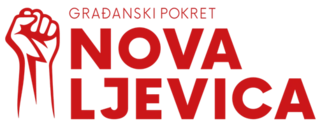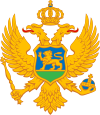The Slavs or Slavic peoples are a group of peoples who speak Slavic languages. Slavs are geographically distributed throughout the northern parts of Eurasia; they predominantly inhabit Central Europe, Eastern Europe, and Southeastern Europe, though there is a large Slavic minority scattered across the Baltic states, Northern Asia, and Central Asia, and a substantial Slavic diaspora in the Americas, Western Europe, and Northern Europe.

Nikšić, is the second largest city in Montenegro, with a total population of 56,970 located in the west of the country, in the centre of the spacious Nikšić field at the foot of Trebjesa Hill. It is the center of Nikšić Municipality with population of 66,725 according to 2023 census, which is the largest municipality by area and second most inhabited after Podgorica. It was also the largest municipality by area in the former Yugoslavia. It is an important industrial, cultural, and educational center.

"Muslims" is a designation for the ethnoreligious group of Serbo-Croatian-speaking Muslims and people of Muslim heritage, inhabiting mostly the territory of the former Socialist Federal Republic of Yugoslavia. The term, adopted in the 1971 Constitution of Yugoslavia, groups together a number of distinct South Slavic communities of Islamic ethnocultural tradition. Prior to 1993, a vast majority of present-day Bosniaks self-identified as ethnic Muslims, along with some smaller groups of different ethnicity, such as Gorani and Torbeši. This designation did not include Yugoslav non-Slavic Muslims, such as Turks, some Romani people and majority of Albanians.

Montenegrins are a South Slavic ethnic group that share a common ancestry, culture, history, and language, identified with the country of Montenegro.

Yugoslavs or Yugoslavians is an identity that was originally designed to refer to a united South Slavic people. It has been used in two connotations: the first in a sense of common shared ethnic descent, i.e. panethnic or supraethnic connotation for ethnic South Slavs, and the second as a term for all citizens of former Yugoslavia regardless of ethnicity. Cultural and political advocates of Yugoslav identity have historically ascribed the identity to be applicable to all people of South Slav heritage, including those of modern Bosnia and Herzegovina, Croatia, Montenegro, North Macedonia, Serbia, and Slovenia. Although Bulgarians are a South Slavic group, attempts at uniting Bulgaria into Yugoslavia were unsuccessful, and therefore Bulgarians were not included in the panethnic identification. Since the dissolution of Yugoslavia and the establishment of South Slavic nation states, the term ethnic Yugoslavs has been used to refer to those who exclusively view themselves as Yugoslavs with no other ethnic self-identification, many of these being of mixed ancestry.

Marko Baša is a Montenegrin retired professional footballer who played as a centre back.
No Name was a Montenegrin boyband, best known for the controversies surrounding their participation in the national pre-selection for the Eurovision Song Contest. The group made its debut in 2005, with the song "Zauvijek moja", winning the 2005 Europjesma and thus representing Serbia and Montenegro in the Eurovision Song Contest 2005. The group fared 7th in the ESC with a total of 137 points, succeeding in obtaining the straight pass to the final of the Eurovision Song Contest 2006 for Serbia and Montenegro. It was founded on 19 November 2003.

Yugo-nostalgia is an emotional longing for the former country of Yugoslavia which is experienced by some people in its successor countries: the present-day Bosnia and Herzegovina, Croatia, Montenegro, North Macedonia, Serbia, Kosovo, and Slovenia. It is a political and cultural phenomenon that includes nostalgia for a time past when the splintered states were a part of one country, grief over the war that tore it apart, and a desire to again unite. Self-described Yugo-nostalgics may express grief at the failure of brotherly love, unity, and coexistence, and distress at division and nationalism, or they may express that their quality of life was better in Yugoslavia.

Islam in Montenegro refers to adherents, communities and religious institutions of Islam in Montenegro. It is the second largest religion in the country, after Christianity. According to the 2011 census, Montenegro's 118,477 Muslims make up 20% of the total population. Montenegro's Muslims belong mostly to the Sunni branch. According to the estimate by the Pew Research Center, Muslims have a population of 130,000 (20.3%) as of 2020.

The Socialist Republic of Montenegro, commonly referred to as Socialist Montenegro or simply Montenegro, was one of the six republics forming the Socialist Federal Republic of Yugoslavia and the nation state of the Montenegrins. It is a predecessor of the modern-day Montenegro.
Montenegrin Australians are Australian citizens of Montenegrin descent.
Nicholas Petanovich, born Nikola Petanović, also known under the alias Naiad, was an American Montenegrin emigrant, philosopher, writer, political publicist and fighter for Montenegro's sovereignty and independence. He was one of the very few amongst the Montenegrin diaspora to achieve higher-level education.
Montenegrins refers to South Slavic people associated with Montenegro.

The Macedonians in Montenegro form a small minority in the country. The last official census showed that there are 900 Macedonians in Montenegro. According to the Macedonian associations in Montenegro there are about 2000 Macedonians living in Montenegro.
Marko Ćalasan is a Macedonian computer systems prodigy. He is noted for being the youngest Microsoft Certified Systems Administrator at the age of eight and the youngest certified computer systems engineer at the age of nine.

The True Montenegro is a right-wing populist political party in Montenegro, formed in January 2018 from the political movement Resistance to Hopelessness (OB), prior to the March 2018 presidential election. Its founder and current leader is Marko Milačić, former journalist and political activist.

The New Left is a minor localist, socially liberal and nationalist political party in Montenegro formed as a local citizens' movement in May 2018 prior to the 2018 Podgorica City Assembly election by Saša Mijović, Montenegrin drug abuse interventionist, NGO activist and the former member of the Young Liberals of Montenegro, youth-branch of the minor DPS-affiliated Montenegrin nationalist Liberal Party of Montenegro.
Anti-Montenegrin sentiment is a generally negative view of Montenegrins as an ethnic group, commonly involving denial of the Montenegrin ethnicity and language, and negative feelings towards Montenegro. It is present in right-wing discourse in Montenegro and the ex-Yugoslavia region, mainly Serbia, and dates back to the 19th and 20th century.

Marko Daković was a Montenegrin and Serbian politician and lawyer, independent MP in the National Assembly of Serbs, Croats and Slovenes, and minister 1941 General Simović's Cabinet. He was the leader of the movement for unification of Montenegro with the Kingdom of Serbia and Yugoslavia in 1918, and one of the most prominent figures in the political life of Montenegro in the interwar period.
In April 2021, a wave of protests, dubbed by its organizers as the Montenegrin Spring, or the Montenegrin Response or Montenegrin Answer, was launched in Montenegro against the announced adoption of regulations that will make it easier to acquire Montenegrin citizenship, but also take away the citizenship of some Montenegrin emigrants, which the protesters consider as an "attempt of the government to change the ethnic structure of Montenegro" and against the Krivokapić Cabinet, which the protesters accuse of being "treacherous" and the "satellite of Serbia".














